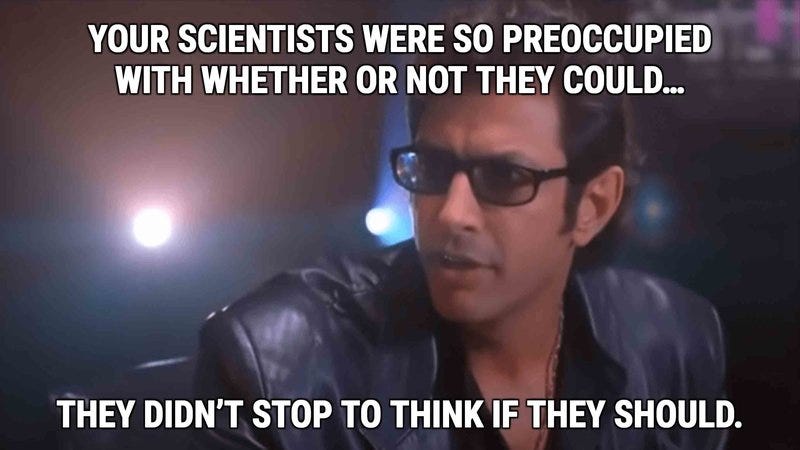That time I wrote a book in a month (and went a bit mad)
What it taught me about good girl syndrome and accountability
Hello! Apart from admiring Bella Hadid’s cowgirl-themed get-ups for NY Fashion Week (which match her “real-life cowboy” boyfriend, very Posh & Becks in the 00s, while her mother Yolanda is showing Architectural Digest round her Texas ranch wearing actual chaps - it’s truly a whole thing), I have been thinking recently about accountability. This Substack is keeping me writing in a way that I am finding very handy - because I said I would do it weekly, and publicly, so I am.
I don’t want to write too much about writing here, wary of feeling a bit navel-gazy. It’s a hangover from working in newspapers that didn’t much like covering other newspapers. “Inside baseball,” one editor called it. We were fascinated, because it was our industry, but would The Readers really care? But now looking back, I think some would… (note the newsprint still devoted to another part of the media, the BBC, while ongoings at newspapers go relatively unmentioned in comparison). Anyway, writing’s played an enormous part in my life, so we can do things differently here - and, whether or not you’re a writer, we’ve all engaged in mad work projects at some point - which is what this post is really about.

I got thinking about it all when I read the latest about NaNoWriMo - short for National Novel Writing Month, it’s a US-based movement where you join forces with others to cheer each other on as you attempt to write a 50,000-word draft in the month of November. It’s recently faced some controversy, as the organisers appeared to wave through the use of AI to write said novels, before backtracking quite a bit. Still, years ago, when I first heard about it, I thought, How brilliant. I should do that. And then didn’t, because I had a full-time job and other commitments, like a lot of us. But eventually, I did write a book, albeit not a novel, in a month.
This is what happened - and the 10 things I learned. Hopefully, some of it will be useful for you.
When someone asks me to do something I’ll do it. I love a brief and the structure of playing within the lines: understanding what someone is looking for and delivering to that. (Which written, down, sounds like textbook people pleaser.) The flipside of that is without exterior pressure, I’ll happily dawdle about in the ideas stage for a long while. That’s the fun bit after all - much harder to actually crank the whole thing out. So it’s not an accident that all that books I’ve written have been at someone’s request - commissions almost, with an outside deadline and real people waiting for me to deliver, not “just” having to be accountable to myself and my ambitions. In this case, it was a quick turnaround for a publisher who had just signed their celebrity author, and wanted to get the 60,000-word book out on the shelves within months.
Other people are very different, and you probably know who you are: do you live a tidy, organised life even when no one is watching? Either way, it is helpful to know yourself rather than hang on to the idea that one day you will wake up a totally different person and just knuckle down. One writer I love, Jessica Knoll, wrote her first novel by promising to send chapters to the woman who would end up her agent; you could fake-create the same sort of urgency by publicly committing to it another way: joining a writing course or group where you have to share your pages at every meeting. Or starting a Substack, and telling your readers it’s weekly… For me, this applies to everything from writing to exercise (I will skip a run in a way I won’t skip a paid-for class. Plus, my gym fines me for late cancellation. The cheek! It works).
You don’t need to clear your diary to write a book. It’s nice to think we need an empty calendar to start a book, or other huge project - I will do it when X is over, on when Y part of my life is in place. And then we don’t have to do anything at all. As it happened, this project hit when I had other work commitments - most do, or they wouldn’t come to you in the first place. And I don’t think it’s actually necessary to clear your day: with fiction, I can manage about four good hours a day then I am done. With non-fiction however, without that imaginative element, I can keep going, which is both bad and good. That said, you will have to give up some things, realistically. In this case, I cancelled all social and fitness plans for a month. A reminder: just because you can, doesn’t mean you should! It was not fun. But:
It will be weirdly addicting. When you totally commit to something, you have nothing else to worry about. A bit like doing a marathon (I imagine) - powered by nerves and focus and adrenaline and then a bit flat when it’s all over and all the ignored emails and life admin comes roaring back.
Others have done this before you. You will check, and find, that other people have attempted and achieved wild deadlines. The screenwriter who wrote a draft in a weekend. Fellow ghostwriters on equally ridiculous schedules. Indie authors writing multiple novels a year. Tim Shipman. However -
The secret is … there is no secret. Sorry about that. No magic shortcut to efficiency that will make it all go by like a study montage in a film. Some drugs might do that, but they were not on the menu. Just oodles of planning, transcribing, and writing, more than you would probably like. But remember:
You need to face reality. A psychologist once told me that missing deadlines is a symptom of perfectionism - you are busy organising your life by how you think you could operate if you were perfect, a robot, rather than by the human reality. So just because your day is clear and you could theoretically write and rewrite for a solid 10 hours, does not mean you actually will. Build in time for breaks, scrolling, staring out the window, fresh air and small bouts of lying on the bed and stress crying (it’s good to keep up with your hobbies). Anyway…
Deadlines are negotiable a lot of the time. For this book, I created insane word count goals, per week and per day, that I put into a calendar and which of course I sailed past each time, as they were not actually physically doable. This calendar started looking worryingly like my revision schedules from exam days at school and uni, which would be updated daily until the last scheduled entry would be something like: Tues 3pm to midnight: reread complete works of Shakespeare. As it was, because of the way holidays fell, and the celeb’s availability, I ended up with less (LESS!) than four weeks to write the thing, from our first conversation to deadline to deliver the draft.
This was not ideal, obviously. There was a very very low point when I hit half way, about 30,000 words done, with a week to go, and rather than celebrating the hill I’d just climbed, I was faced with the reality of having to immediately repeat that again. And yet I decided to just keep going, delivering the final chunk a week after deadline. All in all, it took one month and three days* to write the whole thing, from the very first call with the celeb to decide a chapter breakdown to delivering the final part of the draft. (*One month and one day, really. We cannot count the chapter breakdown!) Which raises the question of:
The good girl trap. Why on earth was I doing this in the first place? You may well ask. I just accepted the tight schedule. Why? A. The publisher’s schedule was actually really tight - books get publication slots and they’re real. B. Sometimes it feels easier to push on and do something in one big rush, rather than stretch out a task for ages. C. I had been set a challenge, and didn’t want to let anyone think I couldn’t do it. Still, as it happens, I now think I could realistically have pushed for a few more weeks once we’d got started. Because I think the editor was actually quite surprised I even came near to hitting the deadline - she was very complimentary about it, which of course I loved (what a good girl). It’s approach that works, up to a point, until you are reminded…
You are not a machine. Repeat. YOU ARE NOT A MACHINE. You cannot hack yourself. If you work very very intensely for a while, for a roughly equal length of time you will be about as much use as a noodle sitting in front of your computer, or at the controls of your forklift truck, or surgeon’s table. Afterwards, I was wiped out. Edits? You must be joking. In the same way drunk you’s euphoria steals from the happiness of hungover you, workaholic you just sucks the energy from post-deadline-crash you. The inside of my brain was pretty much just lalalala by the end. Everyone was pleased with me, which I liked (good girl, right?). But was it worth it? Well. Let’s evaluate, and hear from the great Dr. Malcolm meme:
There’s something to be said for getting a book draft or any other momentous task done in one go, like holding your breath and swimming the length of a swimming pool as fast as you can - if you take a break midway, you’ll flounder and sink. I can’t imagine anything worse, personally, than working on the same manuscript or project for years without any hand-off points - I would lose enthusiasm and interest. I love a goal, ticking things off a list, and finishing up. (Ding ding ding! Here’s a gold star.) And I am sure I am not alone in that. But it’s interesting to wonder about how we’ve maybe been encouraged or conditioned to think that way, and remember there is a cost.
Let’s just say, I am now more careful about my Present Self making plans without much care for the Future Self who will have to execute them. I don’t intend to agree to a deadline like that again, without a bit more (any) negotiation. As for fun: if we are ever in a position to try to enjoy writing, or any other project, why rush it? So no, I will not be attempting NaNoWriMo, or any other rush-to-the-finish-line effort out of choice. I hope. Because a lot of tendencies that push us to do these things are quite deep-wired…
So what about you? Have you ever taken on an insane work project or other project and delivered? Have you ever got a bit addicted to hitting deadlines and positive feedback? I’d love to hear in the comments.
And if you want to know more about how the whole ghostwriting industry works:





Yes, albeit self-imposed. I decided I wanted to make my own dress to attend a friend's wedding, with no sewing experience and 3 days before the wedding. It was insane and amazing and I definitely felt like a mad man at the sewing machine!